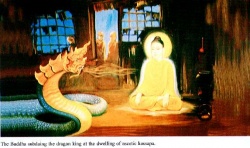Difference between revisions of "Inclusion of Buddhahood in the nine worlds"
m (1 revision: Robo text replace 30 sept) |
|||
| (6 intermediate revisions by 2 users not shown) | |||
| Line 1: | Line 1: | ||
[[File:Dawn 17.jpg|thumb|250px|]] | [[File:Dawn 17.jpg|thumb|250px|]] | ||
<poem> | <poem> | ||
| − | inclusion of | + | [[inclusion of Buddhahood in the nine worlds]] |
| − | [ | + | [[九界即仏界]]・[[九界所具の仏界]] (Jpn [[kukai-soku-bukkai]] or [[kukai-shogu-no-bukkai]] ) |
| − | The principle that the [[World]] of [[Buddhahood]] is inherent in the nine worlds. That is, all beings of the nine worlds possess the potential for [[Buddhahood]] (i.e., the [[Buddha nature]]). The nine worlds refer to the realms of [[Hell]], hungry spirits, [[Animals]], [[Asuras]], human beings, heavenly beings, voice-hearers, cause-[[Awakened]] ones, and [[Bodhisattvas]]. These realms also sig-nify inherent conditions or states of [[Life]] that beings manifest at any given moment. The nine worlds are contrasted with the [[World]] of [[Buddhahood]] in that they are realms or states of [[Illusion]] and [[Suffering]], while [[Buddhahood]] is a state of [[Enlightenment]] free from [[Illusion]] and [[Suffering]]. The principle of [[Buddhahood]] as a potential within the nine worlds means that the beings of the nine worlds, i.e., those who are deluded, inherently possess the state of [[Buddhahood]] and can manifest [[Buddhahood]] from within their lives. This concept is derived from the [[Lotus Sutra]], particularly the "[[Expedient means]]" (second) chapter. Together with the inclusion of the nine worlds within [[Buddhahood]], it explains [[T'ient'ai]]'s concept of the mutual possession of the Ten Worlds. The chapter reads, "The [[Buddhas]], the [[World]]-Honored Ones, wish to open the door of [[Buddha wisdom]] to all living beings." [[Nichiren]] says, "This refers to the [[World]] of [[Buddhahood]] inherent in the nine worlds" (356). That is, [[Buddhahood]] is inherent in all living beings. See also "[[Expedient means]]" chapter. | + | The {{Wiki|principle}} that the [[World]] of [[Buddhahood]] is inherent in the nine [[worlds]]. That is, all [[beings]] of the nine [[worlds]] possess the potential for [[Buddhahood]] (i.e., the [[Buddha nature]]). The nine [[worlds]] refer to the [[realms]] of [[Hell]], [[hungry spirits]], [[Animals]], [[Asuras]], [[human beings]], [[heavenly beings]], [[voice-hearers]], [[cause]]-[[Awakened]] ones, and [[Bodhisattvas]]. These [[realms]] also sig-nify inherent [[conditions]] or states of [[Life]] that [[beings]] [[manifest]] at any given moment. The nine [[worlds]] are contrasted with the [[World]] of [[Buddhahood]] in that they are [[realms]] or states of [[Illusion]] and [[Suffering]], while [[Buddhahood]] is a state of [[Enlightenment]] free from [[Illusion]] and [[Suffering]]. The {{Wiki|principle}} of [[Buddhahood]] as a potential within the nine [[worlds]] means that the [[beings]] of the nine [[worlds]], i.e., those who are deluded, inherently possess the state of [[Buddhahood]] and can [[manifest]] [[Buddhahood]] from within their [[lives]]. This {{Wiki|concept}} is derived from the [[Lotus Sutra]], particularly the "[[Expedient means]]" (second) chapter. Together with the inclusion of the nine [[worlds]] within [[Buddhahood]], it explains [[T'ient'ai]]'s {{Wiki|concept}} of the mutual possession of the Ten [[Worlds]]. The chapter reads, "The [[Buddhas]], the [[World]]-Honored Ones, wish to open the door of [[Buddha wisdom]] to all [[living beings]]." [[Nichiren]] says, "This refers to the [[World]] of [[Buddhahood]] inherent in the nine [[worlds]]" (356). That is, [[Buddhahood]] is inherent in all [[living beings]]. See also "[[Expedient means]]" chapter. |
</poem> | </poem> | ||
{{R}} | {{R}} | ||
| Line 10: | Line 10: | ||
[[Category:Buddhist Terms]] | [[Category:Buddhist Terms]] | ||
[[Category:Buddhist Cosmology]] | [[Category:Buddhist Cosmology]] | ||
| + | [[Category:Buddhahood]] | ||
Latest revision as of 13:59, 30 September 2013
inclusion of Buddhahood in the nine worlds
九界即仏界・九界所具の仏界 (Jpn kukai-soku-bukkai or kukai-shogu-no-bukkai )
The principle that the World of Buddhahood is inherent in the nine worlds. That is, all beings of the nine worlds possess the potential for Buddhahood (i.e., the Buddha nature). The nine worlds refer to the realms of Hell, hungry spirits, Animals, Asuras, human beings, heavenly beings, voice-hearers, cause-Awakened ones, and Bodhisattvas. These realms also sig-nify inherent conditions or states of Life that beings manifest at any given moment. The nine worlds are contrasted with the World of Buddhahood in that they are realms or states of Illusion and Suffering, while Buddhahood is a state of Enlightenment free from Illusion and Suffering. The principle of Buddhahood as a potential within the nine worlds means that the beings of the nine worlds, i.e., those who are deluded, inherently possess the state of Buddhahood and can manifest Buddhahood from within their lives. This concept is derived from the Lotus Sutra, particularly the "Expedient means" (second) chapter. Together with the inclusion of the nine worlds within Buddhahood, it explains T'ient'ai's concept of the mutual possession of the Ten Worlds. The chapter reads, "The Buddhas, the World-Honored Ones, wish to open the door of Buddha wisdom to all living beings." Nichiren says, "This refers to the World of Buddhahood inherent in the nine worlds" (356). That is, Buddhahood is inherent in all living beings. See also "Expedient means" chapter.
